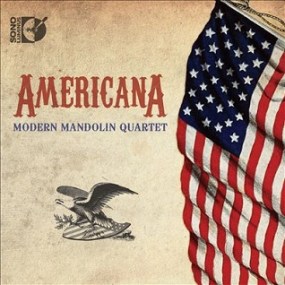Second Inversion hosts share a favorite selection from this Friday’s playlist. Tune in during the indicated hours below on Friday, October 14 to hear these pieces. In the meantime, you’ll hear other great new and unusual music from all corners of the classical genre 24/7!
 Mason Bates: Mothership (BMOP/sound)
Mason Bates: Mothership (BMOP/sound)
Some combinations are wonderful despite the unintuitive relationship of their component parts. Mason Bates’s Mothership contains such a combination. You wouldn’t think that live electronics, a full orchestra, and NASA spaceship sound samples would go well together with the sound of the guzheng, but they do. So sit back, grab some cream cheese for that hot-dog, and enjoy Mothership. – Seth Tompkins
Tune in to Second Inversion in the 10am hour today to hear this piece.
Philip Glass: Etude No.12; Bruce Levingston, piano (Sono Luminus)
 I‘m a total nut for minimalism and usually turn to it when working, running, cooking, commuting, exploring, just about anything. So, I was thrilled to discover Dreaming Awake, a recently released 2-disc journey of Philip Glass’ piano music guided by Bruce Levingston. Ten of his etudes are tucked in between and around The Illusionist Suite, Wichita Vortex Suite (with guest vocals from Ethan Hawke), Dreaming Awake, and Metamorphosis No.2, for an asymmetric but balanced collection.
I‘m a total nut for minimalism and usually turn to it when working, running, cooking, commuting, exploring, just about anything. So, I was thrilled to discover Dreaming Awake, a recently released 2-disc journey of Philip Glass’ piano music guided by Bruce Levingston. Ten of his etudes are tucked in between and around The Illusionist Suite, Wichita Vortex Suite (with guest vocals from Ethan Hawke), Dreaming Awake, and Metamorphosis No.2, for an asymmetric but balanced collection.
I hope you catch Etude No.12 on Second Inversion today. Whereas his first 10 etudes were written primarily as exercises for improving technique, his later etudes are more expressive and emotional. No.12 to me is characteristically “Glass” in many ways – repetitive, steady, with rhythmic, driving arpeggios, and also a somber depth. The musical colors are incredibly poignant in this tribute to American painter Chuck Close, who temporary lost (but later regained) the ability to paint due to a spinal aneurysm. Glass depicts this emotional battle in the music, Levingston communicates it with is playing, and the producers at Sono Luminus record it with such mastery, yielding a stand-out new release in the contemporary classical realm. – Maggie Stapleton
Tune in to Second Inversion in the 2pm hour today to hear this piece.
Stephen Suber: Soleil; Ars Brunensis Chorus (Centaur)
The best music is music that convinces you there is no other music in the world. This week Stephen Suber’s “Soleil” did that for me. He describes the composition as “an orchestral piece without the orchestra,” using only the dynamic human voice to create rhythms and harmonies that grow more complex as the piece continues. Baritones sub as the double bass, tenors become cellos, and percussion is provided by plosives, sibilants, and fricatives. This composition is from his album Starlit and, when asked about it in an interview, Suber refers specifically to “Soleil” when he states that the singers “came so close to reading my mind. They nailed it.” With a review like that it’s no wonder he cites this as his favorite work from the album! – Rachele Hales
Tune in to Second Inversion in the 3pm hour today to hear this piece.
Richard Reed Parry: Heart and Breath Sextet; yMusic and Nico Muhly
(Deutsche Grammophon)
Richard Reed Parry is one of those musicians who really writes from the heart—in this case, literally. His “Heart and Breath Sextet” throws all time signatures out the window and instead instructs the performers to play, well, to the beat of their hearts.
The piece comes from his introspective opus, Music for Heart and Breath: a series of compositions which uses the performers’ hearts and lungs as the performance parameters. Each musician is instructed to play with a stethoscope (and very quietly) in order to stay in sync with their own heartbeat, thus resulting in a beautifully irregular ebb and flow—a soft and serene watercolor come to life.
And as you can imagine, no two hearts beat exactly in time. For this sextet, performed by yMusic with Nico Muhly on piano, the result is a pointillistic effect: starts and stops are staggered, melodies fall out of sync with one another, harmonies bend delicately up and down.
And every once in a while, one of those softly sighing melodies falls in sync with your own heart and breath—a gentle reminder of just how musical it is to be alive. – Maggie Molloy
Tune in to Second Inversion in the 6pm hour today to hear this piece.











